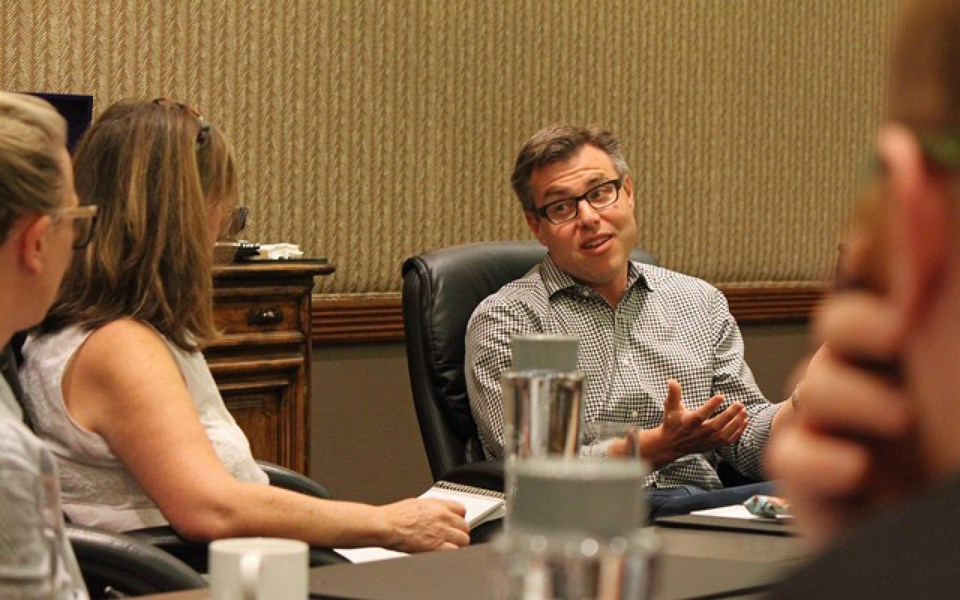VAIL, Colo.—Rob Katz, the chief executive of Vail Resorts, was in Vail last week to talk with governors of Western states who had gathered for their annual summer conference.
The Vail Daily reported that Katz got questions from both Jared Polis, the Colorado governor and a Democrat, and Gary Herbert, the Utah governor and a Republican. Katz's company has ski areas in both states.
The Democratic governor asked Katz questions about preserving public lands near Vail, while the Republican governor asked if the ski industry can continue to grow given what he described as the rigidity of the current environmental regulations. Most Western ski areas operate primarily on federal lands.
Katz, reported the Daily, stuck to his talking points about the economic heft of the outdoor recreation industry but made it pretty clear where his company comes down. The greatest challenge to the ski industry, he said, is "first and foremost climate change," accompanied by weather and snowpack variability.
As for growth of ski areas, he said that Vail Resorts believes the sport does need to grow, and we also believe that it should be growing within its current footprint. The way to do that, he added, is to expand ski terrain within current boundaries and use technology and infrastructure upgrades to move people more efficiently within resorts.
But Katz also said that ski resorts need to expand their customers to include non-traditional customers.
"We have done a great job building within our existing consumer base, but our industry lacks diversity. Our partners are going into cities and providing gear and passes to Latino and African American communities to allow for greater accessibility to a wider community," he said, according to the Western Governors' Association daily summary.
The ski industry has been talking about being more inclusive since at least early in the 21st century—and with relatively little to show for it.
Avalanche debris blocks mountain trails, roads
TELLURIDE, Colo.—Debris and damage from avalanches continues to block mountain paths and roads in Colorado, the residue of an uncommonly snowy winter.
Pearl Pass Road across the Elk Range, between Aspen and Crested Butte, may not be open at all this year. One of the slides that tumbled down into Castle Creek often does so, if not as wildly as it did this year, taking out aspen trees. But another massive slide punched a new path through a forest of spruce trees. Some were 30 metres high and may have been 200 years old.
All these giant sticks along with still melting snow remains at the bottom of the slopes, covering the road. There were also several slides above that monster. Pitkin County, however, will put little, if any, effort to getting the road open this summer, because of higher priorities, reported The Aspen Times.
Carl Buckingham, who seems to wear the title of mayor of Pearl Pass, although there is no town or even hamlet along the way, told the Times that the road is "one of the classic, hard-core Colorado four-wheel-drive trails. It's well used."
In the Bear Creek Valley, the backdrop for the Telluride Bluegrass Festival, the hiking trail remains blocked and will likely remain that way for some time. You can smell the cause of this blockade well before getting here: the powerful scent of acres and acres of fresh-hewn pine, reported Suzanne Cheavens of the Telluride Daily Planet. Lingering in mid-June was compacted snow, six-metre-deep, thick with wood.
"Trees—both aspens and conifers—are snapped like toothpicks everywhere you look, and an expanse of snow blanketed in pine needles and boughs stretches over the trail for about the length of a city block," she wrote.
A 10-kilometre path that runs parallel to Interstate 70 between Frisco and Copper Mountain also will likely remain blocked until probably mid-July. The pathway was buried under tons of debris in March, when all 23 chutes in Tenmile Canyon slid. The debris piles range from a few metres to up to more than six metres for about two kilometres.
The path is part of an extensive network of bicycle trails that would allow a person to pedal from Dillon and Breckenridge across Vail Pass and to Glenwood Canyon. The Vail Pass segment has been cleared.
Other roads have opened but belatedly. That includes Kebler Pass, near Crested Butte, which opened on June 13. But there have been later openings. In 1995, it remained closed until June. Two years prior to that, it remained closed to June 22, Marlene Crosby, the Gunnison County public works director, told the Crested Butte News.




